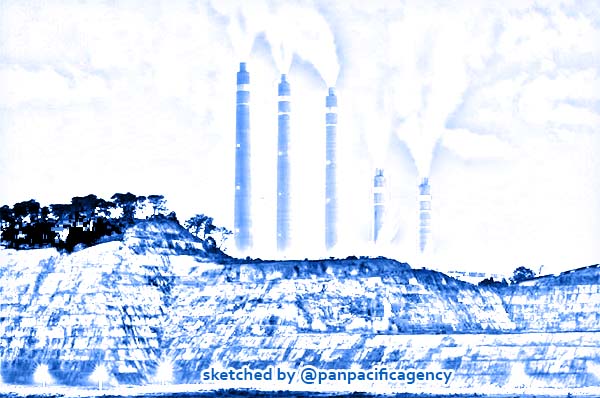[Analytics] Japan misses the bus on decarbonization

Smoke and steam billows from the coal-fired power plant owned by Indonesia Power, next to an area for Java 9 and 10 Coal-Fired Steam Power Plant Project in Suralaya, Banten province, Indonesia, July 11, 2020. Picture taken July 11, 2020. REUTERS/Willy Kurniawan. Sketched by the Pan Pacific Agency.
Toyota President Akio Toyoda has a vision for the Japanese automobile industry in the 21st century. The problem? It’s looking backward at the last century rather than a low-carbon, electrical vehicle future that Toyota’s competitors are embracing. Phelim Kine specially for The Japan Times.
He has dismissed any role for Toyota to lead on the innovations toward a new generation of clean, electrical-powered vehicles. Instead, Toyoda’s adamant that Japan’s largest automaker’s sole nod toward carbon emission reduction remains its line of gas-electric hybrid vehicles line, which debuted in 1997.
Toyoda’s 20/20 hindsight blinds him to growing consumer preference for zero-emission vehicles and the looming bans on emissions-producing vehicles in major markets including the United Kingdom and California. But it’s emblematic of the failure of the Japanese government and its industrial sector to take decisive action to capitalize on the commercial opportunities and climate imperatives of a new industrial revolution that decarbonizes the country’s production processes.
It’s a leadership failure that ignores the tangible benefits that decarbonization would render Japan in terms of slashing fossil fuel import costs, creating new renewable energy sector jobs and mitigating human suffering and economic losses caused by extreme weather events linked to carbon-fueled climate change.
The government of Prime Minister Yoshihide Suga has publicly committed to transition Japan to a decarbonized, zero-emission industrial production model. That includes an Oct. 20 pledge to achieve economy-wide carbon neutrality by 2050. The nonprofit think tanks the Renewable Energy Institute and Agora Energiewende warned this month that achieving that goal requires Japan to “kick-start enhanced climate action as soon as possible … [with] a mix of instruments that combines market-based incentives, targeted support mechanisms and regulatory policies.”
Japan’s Minister of Environment, Shinjiro Koizumi, declared in January that the country is up to the challenge. Koizumi described that decarbonization as the country’s “biggest growth industry” and warned that Japanese industries that failed to embrace decarbonization “will miss the bus” on related commercial opportunities.
Encouraging rhetoric. But a glance at the details of the government’s decarbonization plan raises questions about its viability. Exhibit A of that divide between rhetoric and reality in government policy settings is that the government plans a dramatic expansion of electric vehicle production while allowing production and sale of gasoline burning hybrid vehicles to continue indefinitely. Good news for Mr. Toyoda, bad news for meaningful steps toward industrial innovation for decarbonization.
Japan’s corporate sector is perhaps justifiably dubious of government decarbonization plans. A survey last month of more than 11,000 large and small Japanese firms about the government’s carbon neutrality target revealed that only 15.8% of surveyed companies considered the target “achievable.” That skepticism is unsurprising. An August 2020 analysis of Japanese corporate lobbying on regulations related to decarbonization revealed a damning pattern of deliberate corporate obstruction of government moves toward decarbonization. The analysis revealed how companies in the heavy machinery, automobile, cement and petrochemicals production sectors have consistently sought “to block or dilute the implementation of tougher climate targets.”
Nippon Steel is a hopeful outlier amid Japan’s industrial sector’s foot-dragging on substantive moves to decarbonize their operations. The company has set a target of reducing its carbon emissions by 30% by 2030 and earlier this month announced a research and development initiative to develop new “decarbonization technology.”
It recently announced a package of “major structural reforms” that would cut production capacity by 20% and include the integration of “green technologies” into the production process. Its president, Eiji Hashimoto, has warned that Japanese steel producers who fail to reduce the carbon footprint of the steel production process are at risk of facing “a crisis of survival” from more environmentally conscious competitors.
Growing numbers of those competitors are coalescing around a new international multi-stakeholder policy tool dedicated to accelerate and scale-up the decarbonization of heavy industry to align with a 1.5°C global warming trajectory.
The Global Framework Principles for Decarbonizing Heavy Industry (“Framework Principles”), launched last month after a drafting process that involved close coordination with industry and policy experts across the globe. Those principles constitute the first-ever publicly available global guidance for how to equitably balance economic growth with decarbonization.
The principles outline the role of governments and private industry to ensure the successful decarbonization of heavy industries including steel, cement and chemicals through allocation of public financing for emissions reduction plans. They also specify investment in low— and zero-carbon technologies as a top government and corporate priority to help phase out fossil fuel use in industrial processes.
To date, no Japanese firms have endorsed the Framework Principles. But their growing number of corporate endorsers from neighboring countries, including Tata Steel Ltd. and JSW cement of India and China’s Jinko Solar, reflect how Japan’s regional industrial rivals are seizing the initiative on industrial decarbonization.
Japan has a choice: It can be a passive spectator or an active innovator in the global shift to decarbonized industrial production. Innovation will require government financing initiatives and support for industrial decarbonization pioneers such as Nippon Steel to enable them to become models for the looming low-carbon industrial future. If Japan continues to deploy a 20th century industrial playbook to meet this challenge, its risks ceding 21st century industrial dominance to more innovative regional rivals.
Phelim Kine is the senior director for Asia at the environmental campaign organization Mighty Earth in Washington.